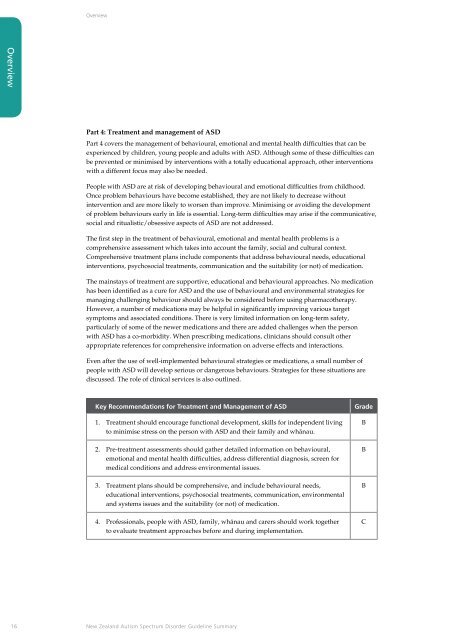New Zealand Autism Spectrum Disorder ... - Ministry of Health
New Zealand Autism Spectrum Disorder ... - Ministry of Health
New Zealand Autism Spectrum Disorder ... - Ministry of Health
Create successful ePaper yourself
Turn your PDF publications into a flip-book with our unique Google optimized e-Paper software.
Overview<br />
Overview<br />
Part 4: Treatment and management <strong>of</strong> ASD<br />
Part 4 covers the management <strong>of</strong> behavioural, emotional and mental health difficulties that can be<br />
experienced by children, young people and adults with ASD. Although some <strong>of</strong> these difficulties can<br />
be prevented or minimised by interventions with a totally educational approach, other interventions<br />
with a different focus may also be needed.<br />
People with ASD are at risk <strong>of</strong> developing behavioural and emotional difficulties from childhood.<br />
Once problem behaviours have become established, they are not likely to decrease without<br />
intervention and are more likely to worsen than improve. Minimising or avoiding the development<br />
<strong>of</strong> problem behaviours early in life is essential. Long-term difficulties may arise if the communicative,<br />
social and ritualistic/obsessive aspects <strong>of</strong> ASD are not addressed.<br />
The first step in the treatment <strong>of</strong> behavioural, emotional and mental health problems is a<br />
comprehensive assessment which takes into account the family, social and cultural context.<br />
Comprehensive treatment plans include components that address behavioural needs, educational<br />
interventions, psychosocial treatments, communication and the suitability (or not) <strong>of</strong> medication.<br />
The mainstays <strong>of</strong> treatment are supportive, educational and behavioural approaches. No medication<br />
has been identified as a cure for ASD and the use <strong>of</strong> behavioural and environmental strategies for<br />
managing challenging behaviour should always be considered before using pharmacotherapy.<br />
However, a number <strong>of</strong> medications may be helpful in significantly improving various target<br />
symptoms and associated conditions. There is very limited information on long-term safety,<br />
particularly <strong>of</strong> some <strong>of</strong> the newer medications and there are added challenges when the person<br />
with ASD has a co-morbidity. When prescribing medications, clinicians should consult other<br />
appropriate references for comprehensive information on adverse effects and interactions.<br />
Even after the use <strong>of</strong> well-implemented behavioural strategies or medications, a small number <strong>of</strong><br />
people with ASD will develop serious or dangerous behaviours. Strategies for these situations are<br />
discussed. The role <strong>of</strong> clinical services is also outlined.<br />
Key Recommendations for Treatment and Management <strong>of</strong> ASD<br />
1. Treatment should encourage functional development, skills for independent living<br />
to minimise stress on the person with ASD and their family and whänau.<br />
2. Pre-treatment assessments should gather detailed information on behavioural,<br />
emotional and mental health difficulties, address differential diagnosis, screen for<br />
medical conditions and address environmental issues.<br />
3. Treatment plans should be comprehensive, and include behavioural needs,<br />
educational interventions, psychosocial treatments, communication, environmental<br />
and systems issues and the suitability (or not) <strong>of</strong> medication.<br />
4. Pr<strong>of</strong>essionals, people with ASD, family, whänau and carers should work together<br />
to evaluate treatment approaches before and during implementation.<br />
Grade<br />
B<br />
B<br />
B<br />
C<br />
16<br />
<strong>New</strong> <strong>Zealand</strong> <strong>Autism</strong> <strong>Spectrum</strong> <strong>Disorder</strong> Guideline Summary











